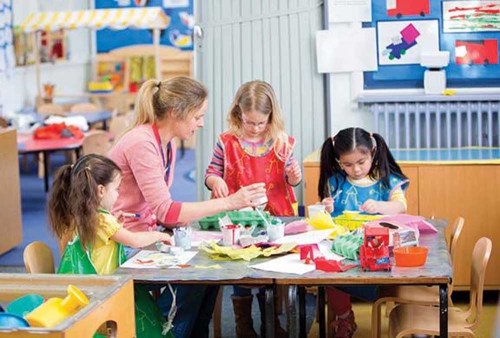Things your child care provider wants you to know
Published 12:00 am Monday, November 1, 2021

- Child care
Child care is a unique partnership between a family and a provider which needs open communication and trust. Child care providers care for and educate other people’s children on a regular and consistent basis. As a parent, you are trusting that your child is happy, healthy, and safe in someone else’s care. Looking back on being a parent who utilized child care, along with my experience as a provider, I’d like to share a few important thoughts.
Child care is not babysitting. We do not just feed, water, and entertain your child. Most of us choose this profession because we enjoy working with children and we want them to be successful. Providers choose this life and career path typically because they feel strongly about early childhood education and making a difference in the lives of children. What some parents view as days of “just playing” is really us supporting your child’s development. Children learn through play and by exploring their world. Providers spend time planning their day to provide a variety of opportunities, activities, and experiences to help children learn and grow. They help teach your child important skills such as putting on a coat, sharing, use their words, navigating their world, and so much more.
Time is important. Just as you value your time, we value ours, as well. Providers have hours of operation and a schedule that supports your child’s learning and play. It’s important to be on time with both drop-offs and pick-ups. Let your provider know if you are running late or not going to make it at all. You never know when just one absence will make a difference in not needing an assistant, or preparing a smaller meal or activities for that day.
Providers have a life outside of child care. If operation hours are 7 a.m. to 6 p.m. that does not mean 6:40 a.m. to 6:30 p.m. If you need to be late or early, we are usually flexible, but check with your provider beforehand. Often times, a provider does not mind the occasional off-hour care, but they may have plans, too. In addition, they have trainings they are required to attend, cleaning, shopping, and paperwork to do. The work does not stop after the eight plus hours with children. Our family needs our time also for school functions, family outings, and self-care. This helps us be ready for children the next day.
Please pay promptly. We are not in it for the money. Though we generally make more than minimum wage, there is also the cost of the program. Your payment is used to keep our small business open. Children need toys, food, and a clean and safe environment. This includes supplies for laundry, cleaning, and organization. We also have child care insurance, requirements for licensing, an assistant, continuing education, and taxes — all of which cost more than you think. When parents are slow to pay, it can put us in a bind and cause disruptions in food service, activities, and keeping the lights on. How would you feel if your boss told you that you’d have to wait another week for your paycheck?
Sick children need to stay home. Our goal is to keep everyone healthy and safe. We understand that it’s important for parent to get to work; you need your job and income to pay your expenses. From a provider’s point of view, it is the same. If a provider gets sick and has to close their program, numerous families will not have care that day or even week. Further, if your child spreads her bug to other kids, numerous other parents may not get to work.
Also, if you are sick, please keep your child home. Chances are your child has already been exposed to what you have, especially with something highly contagious like the stomach flu. Child care providers do not usually include paid sick days in their policies or contracts. Try to help out your child care providers by not spreading illness, when you can.
Lastly, do not be afraid to ask questions. Your provider cannot read your mind. As much as we like to think we are always on the same page, there are times you will have questions. As a former provider, I wanted the parents I worked with to ask me questions and share their concerns. If there is an issue or something bothering you, don’t let it fester. A good working relationship functions best when everyone communicates. Do not assume your provider knows your situation even if you have been with them years. You are a team when it comes to your child; you both have a common goal — your child’s health, safety, and well-being. So, when in doubt, ask.









